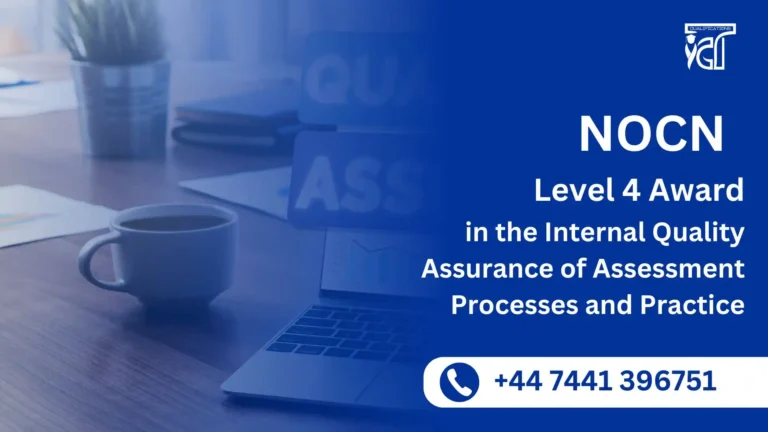Fire safety is an essential component of any organization’s risk management strategy. Ensuring that employees understand the key principles of fire prevention and emergency response can significantly reduce fire-related incidents. The ICTQual Level 3 Award in Importance of Fire Safety is a specialized qualification designed for individuals responsible for managing fire safety in their workplace or sector. This advanced course provides comprehensive training on fire safety management, empowering leaders to take proactive measures to protect people, property, and assets.
The ICTQual Level 3 Award is a comprehensive qualification designed to equip individuals with advanced knowledge of fire safety management. Unlike introductory fire safety courses, this qualification provides a deeper understanding of fire safety risks, legislation, and best practices for managing fire safety within an organization.
This course is ideal for those who have a responsibility for overseeing fire safety protocols and risk assessments. The qualification covers essential topics such as fire safety legislation, fire risk assessments, fire prevention, emergency planning, and more. Participants will gain the skills needed to take on a fire safety leadership role, ensuring that their workplace is compliant with fire safety regulations and best practices.
Participants gain a thorough understanding of fire safety regulations, such as the Regulatory Reform (Fire Safety) Order 2005 and other relevant national and international fire safety standards. This knowledge ensures that organizations stay compliant with legal requirements while maintaining a safe working environment.
The course provides the skills needed to conduct detailed fire risk assessments. Learners will be equipped to identify fire hazards, assess risks, and implement strategies to mitigate fire risks in the workplace. This expertise is crucial for developing effective fire safety policies and procedures.
The ICTQual Level 3 Award in Importance of Fire Safety is an essential qualification for professionals looking to take on leadership roles in fire safety management. It equips participants with the knowledge and skills necessary to assess fire risks, manage fire safety procedures, and ensure compliance with fire safety legislation.
For individuals seeking to improve workplace safety and advance their careers in fire safety, this course is an invaluable investment.
ICTQual Level 3 Award in Importance of Fire Safety
The ICTQual Level 3 Award in Importance of Fire Safety Assessment qualification consists of 7 units for the completed qualification.
- Principles of Fire Safety and Risk Management
- Fire Behaviour and Spread in Different Environments
- Fire Safety Regulations and Industry Standards
- Advanced Fire Prevention and Protection Strategies
- Evacuation Planning and Emergency Preparedness
- Fire Safety Training and Workplace Responsibilities
- Post-Fire Assessment and Recovery Measures
GLH (Guided Learning Hours) and TQT (Total Qualification Time) are terms commonly used in vocational qualifications to help define the amount of time a learner is expected to spend on their studies.
1. GLH (Guided Learning Hours)
GLH refers to the number of hours a learner spends being directly taught, supervised, or supported during their course. This includes the time spent in activities such as:
- Classroom instruction
- Practical workshops
- One-on-one tutoring or mentoring sessions
- Online learning sessions with tutor support
In other words, GLH represents the time that learners are actively engaged with their instructors or learning activities.
2. TQT (Total Qualification Time)
TQT represents the total amount of time a learner is expected to invest in completing a qualification, including:
- GLH (Guided Learning Hours): Time spent on direct learning, as explained above.
- Self-Directed Learning: This includes time spent on independent study, research, assignment completion, preparation for exams, and any other work the learner does outside of direct teaching hours.
TQT is a broader measure that includes all the time required to achieve the qualification. It helps learners and employers understand the overall commitment required for the qualification.
Key Differences Between GLH and TQT:
- GLH focuses on direct learning with guidance or supervision.
- TQT includes GLH as well as independent study time and other learning-related activities.
Example:
If a qualification has a TQT of 600 hours and a GLH of 250 hours, it means the learner should spend 250 hours in direct learning (classroom, online, or tutor-led sessions) and 350 hours on independent study or research.
Here are the learning outcomes for each study unit:
Principles of Fire Safety and Risk Management
- Understand fire safety principles and risk management techniques.
- Learn how to conduct a basic fire risk assessment.
Fire Behaviour and Spread in Different Environments
- Explain fire behaviour and factors influencing its spread.
- Understand how building materials affect fire propagation.
Fire Safety Regulations and Industry Standards
- Identify key industry standards and regulations for fire safety.
- Learn how to ensure compliance with fire safety legal requirements.
Advanced Fire Prevention and Protection Strategies
- Develop and implement effective fire prevention measures.
- Understand active and passive fire protection systems.
Evacuation Planning and Emergency Preparedness
- Learn how to design comprehensive fire evacuation plans.
- Understand the role of emergency preparedness in minimising fire risks.
Fire Safety Training and Workplace Responsibilities
- Recognise the importance of workplace fire safety training.
- Learn the responsibilities of employees and employers in fire safety.
Post-Fire Assessment and Recovery Measures
- Understand how to assess damages and develop recovery plans.
- Learn the steps to improve fire safety measures post-incident.
Here are the key benefits of the ICTQual Level 3 Award in Importance of Fire Safety:
1. Comprehensive Fire Safety Knowledge
The Level 3 Award offers in-depth knowledge of fire safety management, going beyond basic awareness to cover complex topics like fire risk assessments, fire prevention techniques, and emergency planning. This helps participants manage fire safety effectively within their workplace.
2. Advanced Fire Risk Assessment Skills
Participants learn how to conduct thorough fire risk assessments, a critical skill for identifying fire hazards and implementing strategies to mitigate risks, ensuring a safer working environment.
3. Enhanced Leadership in Fire Safety
This qualification is designed for individuals in leadership or management roles, empowering them to take charge of fire safety programs, create policies, and lead fire safety initiatives within their organization.
4. Compliance with Fire Safety Legislation
The course ensures participants are well-versed in relevant fire safety legislation, such as the Regulatory Reform (Fire Safety) Order 2005. This knowledge helps organizations comply with legal requirements, avoiding fines and potential safety violations.
5. Practical Emergency Response Planning
Participants gain skills in developing and managing effective fire emergency response plans, including evacuation procedures, fire drills, and coordination during fire emergencies, ensuring staff are well-prepared to respond in crisis situations.
6. Improved Fire Safety Communication
This course emphasizes clear and effective communication of fire safety policies and procedures, ensuring that employees at all levels understand their role in fire prevention and response.
7. Real-World Application
The qualification includes practical exercises and case studies that enable learners to apply theoretical knowledge to real-world scenarios, helping them build confidence in managing fire safety risks and emergencies.
8. Career Advancement Opportunities
Earning the ICTQual Level 3 Award can significantly enhance career prospects, particularly for those aiming for higher roles in fire safety management, health and safety, or facilities management.
9. Protection of People and Property
With a focus on reducing fire risks and improving emergency responses, the course helps organizations protect their employees, assets, and reputation by preventing fire-related incidents.
10. Flexible Learning Options
The course offers flexible learning formats, allowing participants to complete it in a way that fits their schedule, whether through online learning or in-person training, making it accessible for busy professionals.
These benefits make the ICTQual Level 3 Award in Importance of Fire Safety a valuable qualification for individuals seeking to enhance their expertise in fire safety management and those responsible for the safety of others in the workplace.
The ICTQual Level 3 Award in Importance of Fire Safety is best suited for individuals who are in or aspiring to take on leadership or managerial roles related to fire safety within their organization. This advanced qualification is ideal for:
- Health and Safety Managers – Professionals responsible for overseeing workplace safety, ensuring compliance with fire safety regulations, and implementing fire risk assessments.
- Facilities Managers – Those managing buildings and facilities who need to ensure fire safety standards are met and emergency plans are in place.
- Fire Safety Officers – Individuals who specialize in fire safety and emergency planning, seeking to deepen their expertise in risk management and fire prevention.
- Supervisors and Team Leaders – Managers who oversee day-to-day operations and are responsible for implementing fire safety protocols and conducting training.
- Business Owners/Executives – Particularly in small-to-medium-sized enterprises (SMEs), who need to ensure that fire safety management is effective and compliant with relevant laws.
- Health and Safety Trainers – Professionals who provide fire safety training to employees and want to expand their knowledge in fire safety management and leadership.
This course is perfect for professionals who have a responsibility for managing fire safety in their organization and are looking to enhance their leadership skills, improve safety procedures, and ensure compliance with fire safety legislation.
Entry Requirements
Register Now
Qualification Process
Qualification Process for the ICTQual Level 3 Award in Importance of Fire Safety
- Self-Assessment:
Begin by evaluating your eligibility to ensure you meet the qualification requirements, including work experience, knowledge, and language proficiency. - Registration:
Complete your registration by submitting the required documents, including a scanned copy of a valid ID, and paying the registration fee. - Induction:
An assessor will conduct an induction to confirm your eligibility for the course and explain the evidence requirements. If you do not meet the criteria, your registration will be canceled, and the fee will be refunded. - Assignmnets & Evidence Submission:
Provide all assignmnets and the necessary evidence based on the assessment criteria outlined in the course. If you are unsure of the required evidence, consult with the assessor for guidance on the type and nature of evidence needed. - Feedback and Revision:
The assessor will review your submitted evidence and provide feedback. Evidence that meets the criteria will be marked as “Criteria Met,” while any gaps will be identified. You will be asked to revise and resubmit if needed. - Competence Evidence:
Submit final evidence demonstrating that all learning outcomes have been met. This evidence will be marked as “Criteria Met” by the assessor once it is satisfactory. - Internal Quality Assurance (IQA):
The Internal Quality Assurance Verifier (IQA) will review your evidence to ensure consistency, quality, and compliance with standards. - External Verification:
The IQA will submit your portfolio to ICTQUAL AB External Quality Assurance Verifiers (EQA) for final confirmation. The EQA may contact you directly to verify the authenticity of your evidence. - Certification:
Upon successful completion of all checks, ICTQUAL AB will issue your official certificate, confirming that you have attained the ICTQual Level 3 Award in Importance of Fire Safety.







